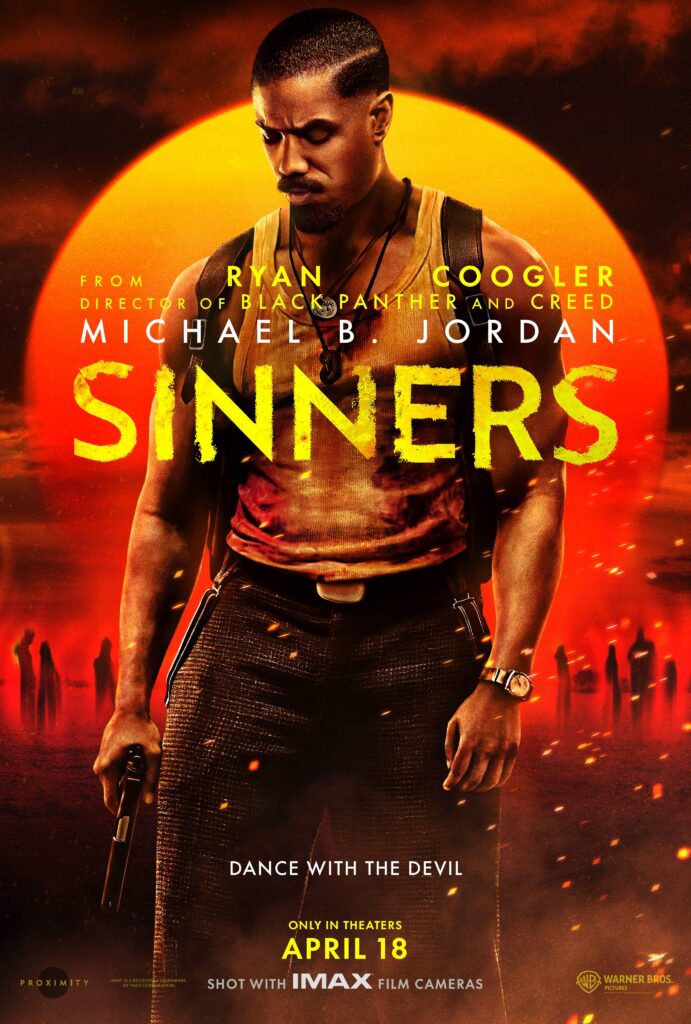Joint Reaction and Review: Trish Matson and Paul Weimer discuss SINNERS

SINNERS (2025)Directed by Ryan CooglerWritten by Ryan CooglerCinematography by Autumn Durald Arkapaw Starring:Michael B JordanMiles CatonHailee StenfeldJack O ConnellWunmi MosakuJamie LawsonOmar MillerDelroy Lindo Trish: The first trailer that I saw last year for “Sinners” was a bit cryptic, but I was excited because it reminded me a bit of a great Actual Play campaign I’d seen on Twitch, based on the Harlem Unbound module for Call of Cthulhu, called Harlem Hellfighters never die, in which Black pilots fresh back from the Great War found that there were even greater horrors lurking back home. Here, the trailer showed some Black men returning to the rural South and facing some kind of horror. And the movie was written and directed by Ryan Coogler, who directed Black Panther and other fine films, and starring Michael B. Jordan, a very fine actor, and numerous other notables! So I was all in for the movie, months ago, tried to avoid further spoilers, and saw it the first chance I got, Saturday of opening weekend. It wasn’t quite what I expected, but it was really great, and I do recommend seeing it in a theater if possible. The plot was gripping, the monsters had some seductive arguments, and the blues music running throughout the movie, and providing and enhancing major plot points, was strong, soaring, pulse-pounding and moving. Paul: For me, this was an unlikely movie to get me to watch. A horror movie, and one that is strongly focused and grounded and centered on music is not something that I normally would have contemplated going to see in the theater, or even renting a stream of. It is completely outside my normal genres on those two axes. I am very glad, however, that I was persuaded to do so. The movie is a slow burn in terms of genre. We get a sense at the beginning, given the wrapping story, that something very bad has happened to Sammie (Miles Caton), driving up to his father’s church wearing bloody rags, clutching a remnant broken neck of a guitar and his preacher father exhorting him to put it down and come to the Lord. Something terrible has happened, but what? The story then jumps back twenty-four hours, and shows us this one-day story. Sammie is a sharecropper on a cotton plantation in the deep south, in 1932, in the Mississippi Delta. He finishes his quota as fast as he is able, so that he can play his beloved music, to the chagrin of his father. Trish: Pastors condemning jazz and blues music as a tool of the Devil is an old trope, of course, about as old as those musical forms themselves. Many a jazz/blues musician has roots in Gospel music, because that’s where a poor Black person would have any opportunity for musical training in rural Mississippi, and many of them have been condemned for turning to “the devil’s music” associated with drinking, dancing, lust, fornication, other sins, and even just staying up late Saturday and missing church on Sunday. Moreover,, Delta blues musician Tommy Johnson claimed to have sold his soul to the Devil in exchange for mastery of the guitar. (Evolving musical forms of rock and roll and their descendants are similarly opposed by fundamentalists.) So the prologue felt very familiar to me, didn’t require any explanation, and instantly provided some worldbuilding references for people who already knew the context. In this case, the preacher was certainly vindicated in his fears for his son, although the danger turned out to be as much on account of Sammie’s mortal peril as for the perils to his soul. Paul: When Sammie’s cousins Smoke and Stack, identical twins ably played by Michael B. Jordan, show up, the plot kicks off. War veterans, former violent enforcers of Al Capone in Chicago, they’ve come back to create a Juke Joint in the Delta, a place for their people to go. So, much of the first act of the movie is Sammie going along with the brothers as they assemble the people they need to make it happen. We get introductions to all the characters that will be central to the drama. Smoke’s estranged wife Annie. Local Chinese shopkeepers and cooks Grace and Bo. Singer Pearline. Pianist Delta Slim, and others, including Stack’s ex-girlfriend Mary (Hailee Stenfeld), who is of mixed race but usually passing for white. The group congregates at a local abandoned sawmill which the twins have bought, with cash, from a local KKK honcho. Tonight, there will be food, drink, and music. MAJOR SPOILERS FOLLOW Paul: Up to this point, this movie is entirely a period piece, soaked in the music of the Blues and of the culture and place of the Mississippi Delta in the 1930s. But the movie starts its slow turn when a mysterious stranger arrives at a farm, claiming that Choctaws were chasing him, and asking to be let in. The couple who own the farm do so. The Native Americans arrive, warn the couple not to let such a dangerous individual as whom they are hunting in, and leave. Meantime, the vampire, for that is what he is, soon turns the couple and the genre part of the movie is off and running, Until the vampires decide to descend on the Juke Joint, the movie shows us our protagonists at their happiest, partying, drinking, eating, having sex, and playing music. One of the more fantastical and mystical and best scenes of the movie for me occurs here. Sammie is invited to play and give his real debut to the audience. We had gotten a voiceover intimation that people who can truly play music can transcend space and time, and this is what actually occurs in this set piece. As the audience dances and sways and reacts to the beautiful and heartfelt music, we see images, flashes of others in the audience, ranging from Africans and Native Americans in the far past, to futuristic costumed individuals beyond even our era of the
Book Review: The River Has Roots, by Amal El-Mohtar

The novella is a retelling of a reasonably well-known fairytale murder ballad, so alert readers may anticipate some of the story beats. There are two sisters, and a suitor, and a warning from beyond via music. But even if a reader has an idea of where the story is going, there are bends in this river of a plot.
736. Iori Kusano (a.k.a. No “L”s Iori) — Hybrid Heart

https://media.blubrry.com/skiffyandfanty/dts.podtrac.com/redirect.mp3/archive.org/download/sand-f-736-iori-kusano/SandF_736_Iori_Kusano.mp3Podcast: Play in new window | DownloadSubscribe: Apple Podcasts | Spotify | Android | Email | TuneIn | Deezer | RSSMass surveillance, dystopian industries, and music, oh my! Shaun Duke and Brandon O’Brien are joined by our friend and wicked good author, Iori Kusano, to discuss their new novella, Hybrid Heart! Together, they tackle Japan’s Idol industry, our very real fears (and very current future) of mass surveillance by corporations, and much more! Thanks for listening. We hope you enjoy the episode!
Signal Boost #32 – A Conversation on Silly Audience Questions

https://media.blubrry.com/skiffyandfanty/dts.podtrac.com/redirect.mp3/archive.org/download/SandFSignalBoost32SillyQuestions/Sandf–SignalBoost32–SillyQuestions.mp3Podcast: Play in new window | DownloadSubscribe: Apple Podcasts | Android | Email | TuneIn | RSSSignal Boost is back! In our 1st boost festival of the year, a very sick Jen and a dissertation-downtrodden Shaun attempt to answer a few of your silly questions. Based on questions by @Runalongwomble and @timata87, we tell you about our secret Jaeger names, our fight songs, and the sf/f worlds we like to live or go on vacation in! It’s a bit of absurd podcastery with a heavy dose of laughs, and when it’s all done, we take a minute to share some mini-boosts. We hope you enjoy the episode!
Month of Joy: Things That Bring Me Joy by Stina Leicht

I love my friends deeply. I’m closer to my friends than I am to certain members of my family. As I see it, friends are the family you get to select for yourself. One of my favorite things to do with friends is to discover stuff. A friend of mine dropped in from Canada recently, and we went to a restaurant I’d never gone to before. Then we went to a nightclub I didn’t know about and watched a band play that I’d never heard before. I even learned how to swing dance for the first time. We capped it off with a visit to a vintage candy store filled with the sorts of candy you remember from childhood. That was a wonderful, memorable evening. I love music. It’s a big part of my creative side and is important to my writing process. I’m always looking for new music. As it happens, one of my best friends used to be a professional DJ, and one of our favorite things to do is to invite a close-knit group of friends over to drink, chat, and listen to music.
Month of Joy: Music by Mike Brooks

There are, actually, many things that give me joy, despite the rather unfortunate state the world is in at the moment. My wife, my friends, my cats, reading and writing science fiction and fantasy… the list just goes on and on. However, another of the most prominent and important ones is music. As a child, I learned to play the recorder (because that was what one did in primary school), the piano (briefly, badly) and the cornet (allowing me to claim with technical accuracy that I am a “classically-trained musician”, which is mildly hilarious). However, I never had much time for music on the radio. It wasn’t until I was about thirteen and heard The Offspring’s “Self Esteem” when Jamie Dreher snuck a battery-operated tape player along to Scouts summer camp that I realised that songs could actually have a point to them. I didn’t look back.

